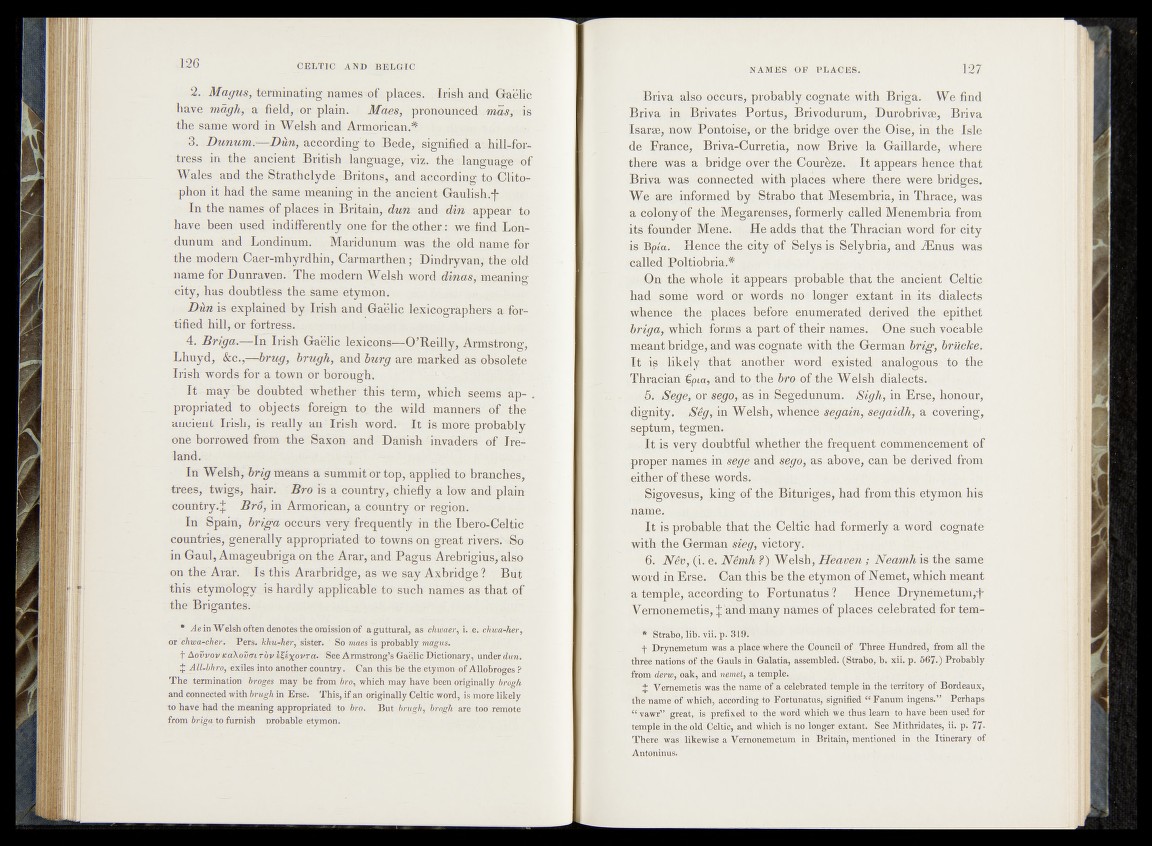
2. Magus, terminating names *©f places. Irish and Gaelic
have magh,& field, >or plain. Maes, pronounced mas, fis
the same word in Welsh and Armorican.^
3. Dunum,)—Diin, according"!© Bede, signified a hill-foi~
tress in the ancient British language, .viz., the language of
Wales and the Strathclyde Britons, and according, to iClito-
phori it had the same meaning in the ancient Gaulish.f
In the names of places in Britain, daw and din appear to
have been used indiiFerently^one-for the o ther: we find Lon-
dunum and Londinum. Maridunum was the yald name for
the modem C&er-mhyrdhin, Carmarthen; Dindryvan, the.iold
name for Dunraven. The modern Welsh word dinas, meaning
city, has doubtless the.:same etymon.
Diin is explained by Irish and Gaelic lexicographers a fortified
hilly.or fortress.
4. Briga.—-In Irish Gaelic lexicons—-O’Reilly,. Armstrong^
Lhuyd, &c.,—brug, brugh, and burg are marked as obsolete
Irish words for a town or borounOh.
I t ^ a y % e doubted whether this term^which £&$$$'j&p- j
propriated to objects foreign to the wild m a n u e r^ J , the
ancient Irish, is really an Irish word. It is more probably
one borrowed from th e Saxon and Danish invaders Ireland.
n
In Welsh, brig means a summit or top, applied fgt b ranched
trees, twigs, hair. Bro is a country, chiefly a low apd plain
c o u n t r y Bro, in Armorieany a country ofregion:
In Spain, briga occurs very- frequently in the Ibiero-Celtic
countries, generally appropriated to towns on great rivers.NsS©
in Gaul, Amageubriga on the Arar, and. Pagus Arebrigius, hlao
on th e Avar, Is this Ararbridge, as we say Axbridge? But
this etymology is hardly applicable to such names as that of
the Brigaritesi -
* Ae in Welsh often denotes,the omiggion of a guttural^ as chvsaer, L chwa-her,
ot ~chwa-cher. Pers. hhuAker, sister. | So maes is probably magus. ■
j t Aovvov KaXovpiTov l^k'govra. !See Armstrong’s GaelicDictionary, underpin'.
fjiIt-hhro,•exiles into another country. Can thistle the etymon of Allohroges ?
The termination broges may be from bro, which may have been originally brdg/i
and connected with brugh in Erse. This, if an originally Celtic word, is more likely
to have had the meaning appropriated "to -bao,. But ,brumal brogh are too remote
from briga^to furnish probable etymon.
Briva ,also occurs, probably cognate with Briga. We find
Briva. in Brivptes Portas, Brivodurum, Durobrivæ, Briva
Isarse, now Pontoise, or the. bridge .over, the Oise, in the Isle
de France, Briva-Gurretia, now Brive d a Gaillarde, where
there >vas a bridge oyer the Courèze. It appears hence .that
Briva. was connected with places» where there were bridges.
We. are informed by, Strabo that Mesembria, in Thrace, was
a colony of the Megarenses, formerly called Menembria from
it§ founder i^fetxe.î*» He adds that fo r city
is Bp,'ca. ' Henee theycity of Sel-ys.is. Splybria, and Ænus was
called Poltiobria.*
i »,L)n the whole itftappears probable that the ancient Celtic
had some word*. OjPi wprds ..no longer extant in .its dialects
when ce > the ; .places , before enumerated, derived the epithet
briga, which, forms a part of their n%milsTri -iQnë sûch vocable
meant bhi«d§d| and was epgna^e.with the German brig, brücke,
It j4s likejy^that fmpthmfe-word existed ' analogous' to the
Thracian tpia, and tqytbe bro of the Welsh dialect^%v4
Sp,go.*c>i:sego. .&&- in Segedunum. *$igh, invErse, honour,
dÿgni^} rSêg%in Welsh, whence segaiii,, segaidh, a covering,
sbptiim, tegmen.'
. It is véry» doubtful whether the frequent commencement of
proper names in - and sego, as above, can be derived from
„eifekePiOf these ■ words.
, Sigovesiis, king ©f.the Bituriges, had from this etymon his
namfèj^
It is probable that the Celtic had formerly a word, cognate
with the Gerapan sieg, victory.
6. Név, (if e. Némh ?) Welsh, Heaven ; Neamh is the same
word in Lkse; Can this be the etymon of Nemet, which meant
a temple, according, to Fortunâtuà? Hence Drynëmetum,f
VemOnemetisjÆ and many names pf places, celebrated for tem-
* Strabo,'liiv'H.'k’^i^P^
f Drynemetum was a placewhere the Cöuncil of . Three Hundred, from all the
three nations of the Gaulsitf Galatia, assembled. (Strabo, b. xii. p. 567.) Probably
from derw, oak, and nemetj a temple,
■ *' $ Vememetis was thé'namv of'krifeïebrated temple ip the territory of Bordeaux,
the name óf which, according to Eôftiïnktïis, signified “ Fanutn ingens.” Perhaps
“ vawr” great, is prefixed to .the word ,r?Mch we thus learn to have been used for
temple in the old^ Celtie, and which is no longer extant. See Mithridates, ii. p. 77-
There was likewise a Vetnoneroetum in Britain, mentioned in the Itinerary of
Antoninus;